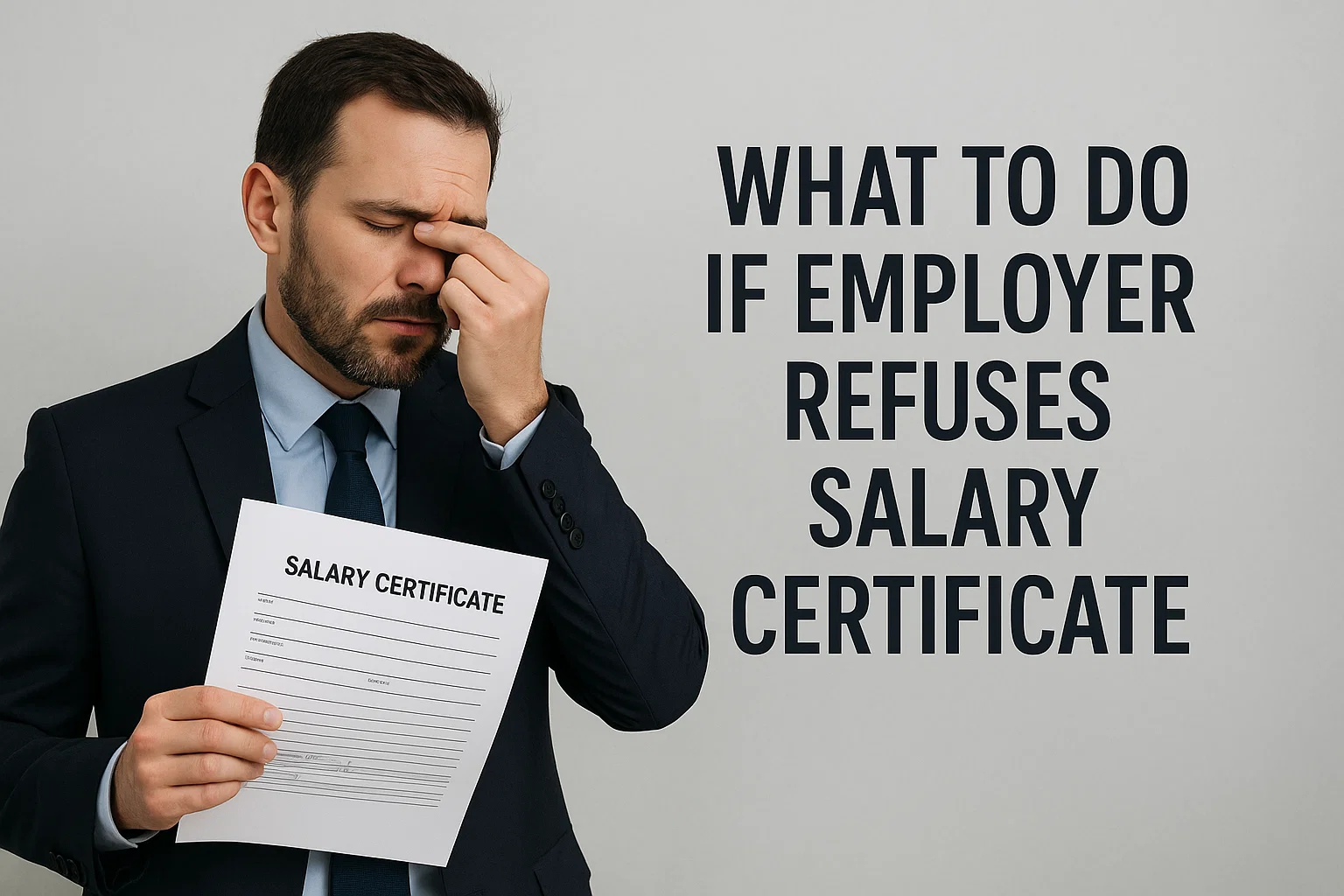What to Do If Employer Refuses Salary Certificate

Imagine applying for a loan or a visa, only to find your employer refuses to provide a salary certificate. This document, often required for financial or legal processes, proves your income and employment status. Without it, you might face delays, rejections, or added stress. The frustration of being stuck in this situation can feel overwhelming, especially when you’re unsure about your rights or next steps. Fortunately, this detailed guide offers practical solutions to navigate this challenge. From understanding why employers refuse to provide the certificate to exploring legal and alternative options, you’ll find clear, actionable advice to resolve the issue efficiently.
Why Employers Might Refuse a Salary Certificate
Employers may hesitate to issue a salary certificate for various reasons. Some might cite internal policies or claim they don’t provide such documents. Others may delay due to administrative inefficiencies or concerns about confidentiality. In rare cases, employers might refuse to avoid revealing discrepancies in payroll or tax reporting. Understanding their reasoning can help you approach the situation strategically.
Communicate Clearly with Your Employer
Start by addressing the issue directly with your employer. Request the salary certificate politely in writing, explaining its purpose (e.g., loan application or visa processing). A formal email ensures clarity and serves as a record. If they refuse, ask for a specific reason to understand their stance. Clear communication often resolves misunderstandings quickly.
Check Your Employment Contract and Local Laws
Review your employment contract to see if it mentions the provision of a salary certificate. Many contracts outline an employer’s obligation to provide such documents. Additionally, research local labor laws in your country or region. In some places, employers are legally required to issue salary certificates upon request. Knowing your rights strengthens your position.
Escalate to HR or Management
If your initial request is denied, escalate the matter to the HR department or higher management. Present your case professionally, referencing your contract or legal rights if applicable. HR may have standard procedures for issuing a salary certificate that your immediate supervisor overlooked. Persistence with the right department can yield results.
Alternative Documents to Prove Income
If your employer remains uncooperative, consider alternative ways to prove your income. These options can often satisfy banks, landlords, or government agencies:
-
Pay Slips: Collect recent pay stubs showing your salary details.
-
Bank Statements: Provide statements reflecting regular salary deposits.
-
Tax Returns: Submit tax documents that confirm your income.
-
Employment Verification Letter: Request a letter confirming your job and salary.
Ensure these documents are recent and clearly show your income details.
Contact Labor Authorities or Legal Advisors
When internal efforts fail, reach out to local labor authorities. Many countries have labor boards or government agencies that handle workplace disputes. File a formal complaint if your employer’s refusal violates labor laws. Alternatively, consult a labor lawyer for advice tailored to your situation. Legal experts can guide you on enforcing your right to a salary certificate.
Use Professional Networks for Advice
Sometimes, colleagues or professional networks can offer insights. Discreetly ask peers if they’ve faced similar issues and how they resolved them. Online forums or platforms like LinkedIn may also provide tips or connect you with professionals familiar with local regulations. Sharing experiences can uncover practical solutions.
Negotiate a Compromise
If legal action feels excessive, try negotiating with your employer. Propose a simplified version of the salary certificate, such as a signed letter confirming your salary and employment. Some employers may agree to this if they’re hesitant about formal certificates. Be flexible but firm about your needs.
Document All Interactions
Keep a record of all communications with your employer regarding the salary certificate. Save emails, note dates of verbal conversations, and document responses. This paper trail is crucial if you need to escalate the issue to authorities or pursue legal action. Organized records strengthen your case.
When to Consider Leaving Your Job
In extreme cases, an employer’s refusal to provide a salary certificate may signal deeper issues, like unethical practices or poor management. If the refusal persists and affects your financial or legal needs, evaluate whether staying with the company is worth the hassle. Explore job opportunities that align with fair and transparent practices.
Preventive Measures for the Future
To avoid similar issues in the future, take proactive steps:
-
Clarify Document Policies: Ask about salary certificate policies during job interviews.
-
Maintain Personal Records: Save pay slips and bank statements regularly.
-
Understand Local Laws: Stay informed about your labor rights.
-
Build a Strong Relationship with HR: A good rapport can ease future requests.
These habits ensure you’re prepared for any documentation needs.
Why a Salary Certificate Matters
A salary certificate is more than just paperwork. It’s a key document for loan approvals, visa applications, or even renting a home. Without it, you may face delays or rejections, impacting your financial stability or personal goals. Resolving this issue promptly is crucial to avoid disruptions.
Final Thoughts
Dealing with an employer who refuses to provide a salary certificate can be frustrating, but you have options. Start with clear communication, escalate if needed, and explore alternatives like pay slips or bank statements. If necessary, leverage labor authorities or legal advice to enforce your rights. By staying informed and proactive, you can overcome this hurdle and secure the documentation you need. Take action today to protect your financial and legal interests.







